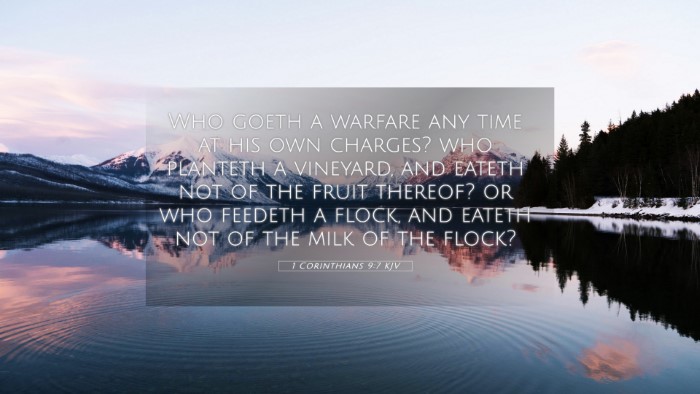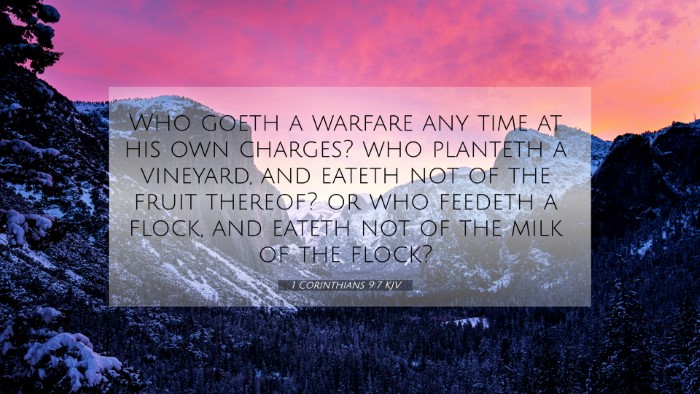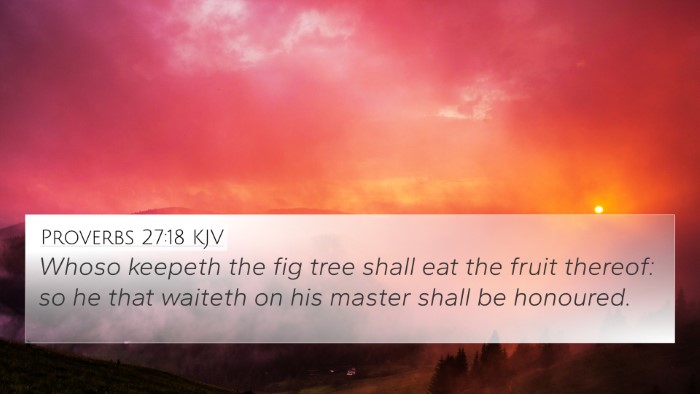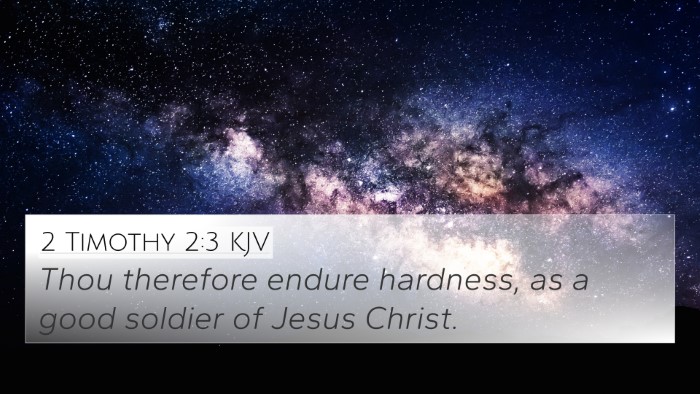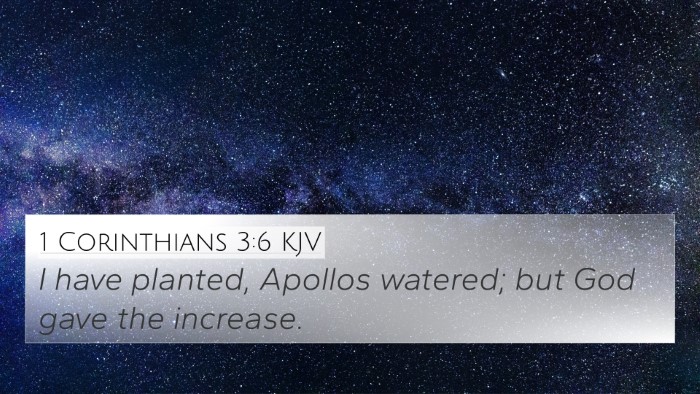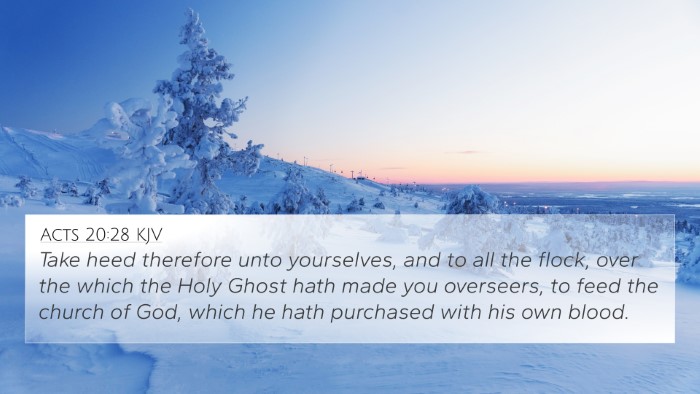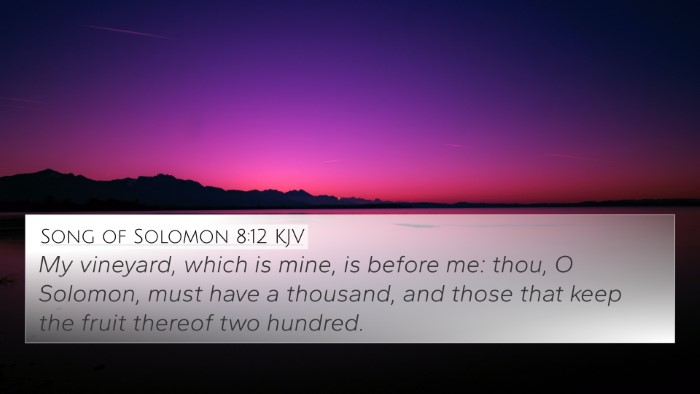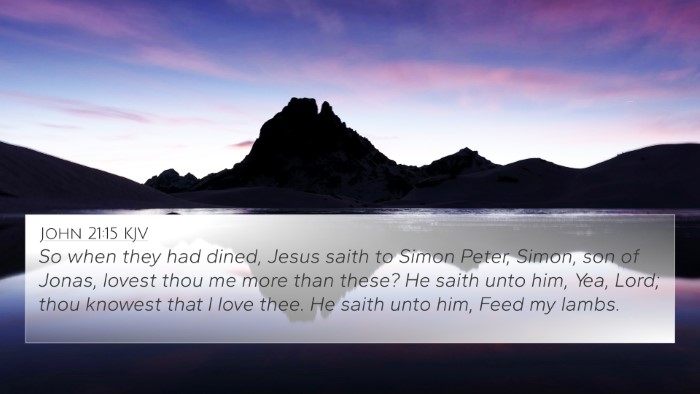Bible Verse: 1 Corinthians 9:7
This verse states: "Who serves as a soldier at his own expense? Who plants a vineyard and does not eat its grapes? Who tends a flock and does not drink the milk?" This scripture highlights the principle of entitlement for laborers regarding their sustenance derived from their labor.
Meaning and Interpretation
The Apostle Paul addresses the rights of workers in ministry, using analogies from everyday life to illustrate his point. Paul asserts that just as soldiers, farmers, and shepherds derive benefits from their work, so too should those who preach the Gospel receive appropriate support and provision from those they serve.
Insights from Public Domain Commentaries
-
Matthew Henry:
Henry emphasizes that this verse draws on natural justice, stating that those who labor deserve to reap the rewards of their labor. He notes that it is customary for those engaged in skilled professions to expect remuneration, underscoring that spiritual workers should not be treated differently.
-
Albert Barnes:
Barnes offers an interpretative view of this verse by noting the cultural contexts of Paul’s illustrations. He conveys that just as a soldier's life entails sacrifice and service, so too should ministers receive their living from their ministry, especially in contexts where they provide spiritual nourishment.
-
Adam Clarke:
Clarke draws on the agricultural and pastoral imagery present in the verse. He discusses how these professions not only serve societal needs but are also entitled to share in the benefits that result from their efforts. Clarke points out that the desire for compensation is not rooted in greed but in the logic of sustaining ministry work.
Cross-References
This verse connects with several other scriptures that discuss the principles of provision and support in ministry:
- Deuteronomy 25:4: "Do not muzzle an ox while it is treading out the grain." - This Old Testament law reflects the same principle of allowing those who labor to enjoy the fruits of their work.
- 1 Timothy 5:17-18: "The elders who direct the affairs of the church well are worthy of double honor, especially those whose work is preaching and teaching." - Paul reiterates the importance of supporting church leaders financially.
- Galatians 6:6: "Nevertheless, the one who receives instruction in the word should share all good things with their instructor." - Another affirmation of the right of spiritual leaders to receive support from their congregations.
- Luke 10:7: "Stay there, eating and drinking whatever they give you, for the worker deserves his wages." - Jesus instructs his disciples to receive hospitality, indicating the expectation of provision for those who work in ministry.
- Matthew 10:10: "No bag for the journey, or extra shirt or sandals or a staff, for the worker is worth his keep." - Christ emphasizes the need for missionary support as they preach the Gospel.
- Philippians 4:15-18: Paul reflects on the support he received from the Philippians, indicating that their contributions were a fragrant offering to God.
- 1 Corinthians 3:8: "The one who plants and the one who waters have one purpose, and they will each be rewarded according to their own labor." - This reveals the reward tied to the work done in the ministry.
Thematic Connections
Thematically, 1 Corinthians 9:7 encourages reflection on the broader implications of support and provision within the Christian community. It promotes an understanding of the collective responsibility to support those who minister spiritually and echoes throughout both the Old and New Testaments.
Through biblical cross-referencing and studying these connections, believers can gain a deeper appreciation of not only 1 Corinthians 9:7, but the whole biblical narrative that emphasizes justice, support, and the communal aspect of ministry.
Conclusion
In conclusion, 1 Corinthians 9:7 serves as a powerful reminder of the rationale behind supporting those who labor in the gospel. By exploring cross-referenced texts, believers are directed to a richer understanding of scriptural interconnections and the overarching themes present in God's word. Using tools for Bible cross-referencing can significantly enrich one's study, enabling deeper insights into the connections between Bible verses.

